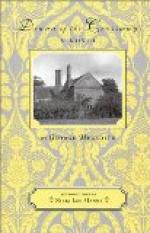If it should seem a small one, let it be remembered that a snub was intended, and was foiled; and foiled with an apparent simplicity, enough to exasperate, had there been no laughter of men to back the countering stroke. A woman under a cloud, she talked, pushed to shine; she would be heard, would be applauded. Her chronicler must likewise admit the error of her giving way to a petty sentiment of antagonism on first beholding Mrs. Cramborne Wathin, before whom she at once resolved to be herself, for a holiday, instead of acting demurely to conciliate. Probably it was an antagonism of race, the shrinking of the skin from the burr. But when Tremendous Powers are invoked, we should treat any simple revulsion of our blood as a vice. The Gods of this world’s contests demand it of us, in relation to them, that the mind, and not the instincts, shall be at work. Otherwise the course of a prudent policy is never to invoke them, but avoid.
The upper class was gained by her intrepidity, her charm, and her elsewhere offending wit, however the case might go. It is chivalrous, but not, alas, inflammable in support of innocence. The class below it is governed in estimates of character by accepted patterns of conduct; yet where innocence under persecution is believed to exist, the members animated by that belief can be enthusiastic. Enthusiasm is a heaven-sent steeplechaser, and takes a flying leap of the ordinary barriers; it is more intrusive than chivalry, and has a passion to communicate its ardour. Two letters from stranger ladies reached Diana, through her lawyers and Lady Dunstane. Anonymous letters, not so welcome, being male effusions, arrived at her lodgings, one of them comical almost over the verge to pathos in its termination: ’To me you will ever be the Goddess Diana—my faith in woman!’
He was unacquainted with her!
She had not the heart to think the writers donkeys. How they obtained her address was a puzzle; they stole in to comfort her slightly. They attached her to her position of Defendant by the thought of what would have been the idea of her character if she had flown—a reflection emanating from inexperience of the resources of sentimentalists.
If she had flown! She was borne along by the tide like a butterfly that a fish may gobble unless a friendly hand shall intervene. And could it in nature? She was past expectation of release. The attempt to imagine living with any warmth of blood in her vindicated character, for the sake of zealous friends, consigned her to a cold and empty house upon a foreign earth. She had to set her mind upon the mysterious enshrouded Twelve, with whom the verdict would soon be hanging, that she might prompt her human combativeness to desire the vindication at such a price as she would have to pay for it. When Emma Dunstane spoke to her of the certainty of triumphing, she suggested a possible dissentient among the fateful Twelve, merely to escape the drumming




